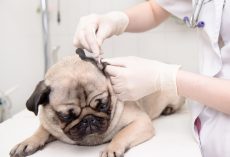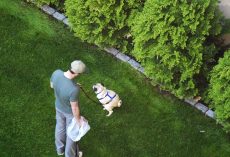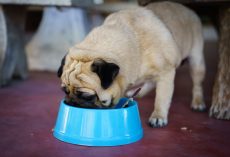What is a collapsed trachea? Read on to find out how it can affect your doggy.
This hereditary canine condition is referred to as tracheal collapse, and it most commonly affects toy breeds, such as Poodles, Yorkshire Terriers and Pomeranians.
What Are the Symptoms of Tracheal Collapse?
Although the condition is hereditary, many dogs do not show signs of tracheal collapse until middle age.
Affected dogs have a characteristic “honking” or “seal bark” cough that worsens when they are active or excited.
Severely afflicted canines may have long bouts of coughing, which can lead to respiratory distress and possibly even death because uncontrolled bouts of coughing often cause edema and swelling within the trachea.
How Is the Condition Diagnosed?
Tracheal collapse is often suspected in toy breed dogs who present with a telltale cough, but tests are required for a definitive diagnosis.
Chest X-rays are used to determine whether the collapse is located in the throat (cervical) portion of the trachea or within the chest (intra-thoracic) area of the windpipe.
How Do You Treat Tracheal Collapse?
Reduce a dog’s exposure to smoke, pollen, dust and other allergens by installing HEPA-style air filters and vacuuming regularly.
Treat obesity by devising a weight-loss plan that’s supervised by your veterinarian.
Avoid overexcitementAre There Other Treatments for the Condition?
Surgery tends to be most successful when the collapse is located within the throat (cervical) portion of the trachea. Basically, a rigid prosthesis is permanently placed around the trachea, effectively creating a noncollapsible tube.
A newer, noninvasive technique for treating tracheal collapse is the placement of an expandable metal stent inside the trachea with the aid of fluoroscopy or bronchoscopy.
A collapsed trachea in your pooch may sound scary, but with treatment and attention, Fido can have a normal life. If your dog's breed is prone to a collapsed trachea, make sure you watch out for the many symptoms.
For more information on collapsing tracheas, visit Care2.









